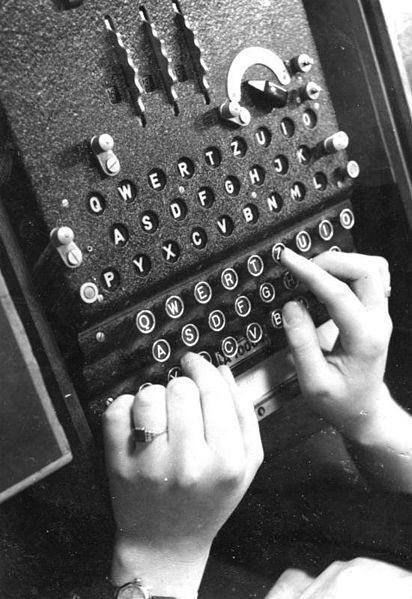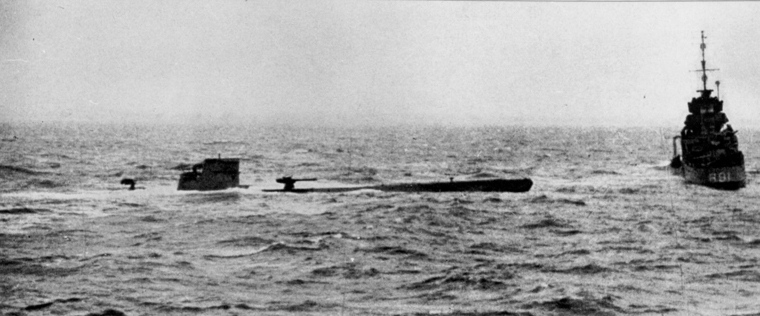It felt appropriate that my History Geek Column this month would revolve around Ian Fleming, creator of James Bond. This story takes us before his days as an important officer and right into the heart of World War II, when he was working for British Naval Intelligence.
During the war, it was difficult to crack enemy codes, particularly since the German’s were using Enigma cipher machines. They were mechanical and electrical rotor machines that automated cryptographic texts that the Nazis were using to relay orders to their submarines and other places. Since it was so difficult to decode without the use of one of the machines, capturing an Enigma machine became a Holy Grail for the British. (The machines themselves are endlessly fascinating and you can read more about them here.)
Perhaps the only way to capture an Enigma machine was to pull it right off a German naval vessel, but raiding a boat like that would almost certainly force the German’s to destroy so valuable a tool before the allied forces would be able to get a hold of it. A more devious strategy had to be devised.
That was Fleming’s job.
On September 12, 1940, Fleming wrote the following missive to the director of Naval Intelligence with his plan to capture a German code machine, dubbing it “Operation: Ruthless”:
TOP SECRET.
For Your Eyes Only.
12 September 1940.
To: Director Naval Intelligence
From: Ian FlemingOperation Ruthless
I suggest we obtain the loot by the following means:
1. Obtain from Air Ministry an air-worthy German bomber.
2. Pick a tough crew of five, including a pilot, W/T operator and word-perfect German speaker. Dress them in German Air Force Uniform, add blood and bandages to suit.
3. Crash Plane in the Channel after making SOS to rescue service.
4. Once aboard rescue boat, shoot German crew, dump overboard, bring rescue boat back to English port.In order to increase the chances of capturing an R or M (these are different sorts of German boats he’s referring to) with its richer booty, the crash might be staged in mid-Channel. The Germans would presumably employ one of this type for the longer and more hazardous journey.
NB. Since attackers will be wearing enemy uniform, they will be liable to be shot as franc-tireurs if captured, and incident might be fruitful field for propaganda. Attackers’ story will therefore be that it was done for a lark by a group of young hot-heads who thought the war was too tame and wanted to have a go at the Germans. They had stolen the plane and equipment and had expected to get into trouble when they got back. This will prevent suspicions that party was after more valuable booty than a rescue boat.
It certainly was a ruthless plan, as it was clearly a suicide mission for all those participating. Being caught in an enemy uniform negated all rules of war that the German’s only barely played by in the first place. It was bold and creative and the director of Naval intelligence thought it just might work, so he approved the plan.
Fleming went to Dover to oversee the mission, waiting for a German bombing raid with his team so they could simulate that perfect cover story for their rescue, but the right mission conditions were never met and the operation was eventually scrapped.
There was a great disappointment that the operation never went through since capturing the machine was vital to the success of the Allied war effort.
Eventually, the British would capture an enigma, but that wouldn’t happen until May of 1941, when the German commander of U-110 assumed his boat was sinking and ordered his crew to leave their Enigma and codebooks and abandon ship. They began fleeing the ship, but it wasn’t sinking. In an act of quick thinking, the British commander who had been attacking ceased his attack on the ship when he realized it wasn’t sinking, instead focusing on dealing with the fleeing Germans.
His crew entered the ship and took everything aboard that was portable, including the code books and the Enigma, then sunk the boat so the Germans wouldn’t realize their codes had been broken.
The fact the British had an Enigma was so secret that it took even Franklin Roosevelt a year to find out when Winston Churchill told him about it personally.
For Fleming’s part, he eventually went on to write one of the most popular series of spy novels of all time and created one of the most iconic characters in film and literature in James Bond.
Be sure to check out past installments of The History Geek here!

